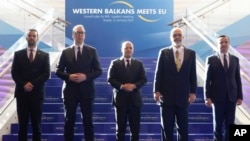The leaders of Western Balkan countries pledged Monday to make full use of the European Union's financial support plan of 6 billion euros ($6.5 billion) as they continue to seek membership in the bloc.
Serbia, Kosovo, Bosnia, Montenegro, North Macedonia and Albania are at different stages of the accession process. Their leaders gathered in North Macedonia's capital, Skopje, and said in a joint statement they were committed "to the development of their countries to follow European standards."
In November, the European Commission presented a Growth Plan for the Western Balkans to enhance economic integration with the EU's single market, boost regional economic integration, accelerate fundamental reforms, and increase financial assistance.
The plan includes a proposed 6-billion-euro reform and growth scheme to be given out over three years, 2024-2027, contingent on agreed reforms. Its main aim is to help double the Western Balkans' economy throughout the next decade. The funding hopes to address frustration among residents of candidate countries with the slow pace of the membership process, as well as maintain the countries' alignment with the West as Russia's war against Ukraine continues.
Present at Monday's meeting were Serbian President Aleksandar Vucic, Albanian Prime Minister Edi Rama, Kosovo's Albin Kurti, Montenegro Prime Minister Milojko Spajic and the North Macedonian premier, Dimitar Kovacevski.
The U.S. Assistant Secretary of State for European and Eurasian Affairs James O'Brien, and the director general for neighborhood and enlargement negotiations at the European Commission, Gert Jan Koopmann, were also present.
"Each country is responsible for its own reforms and for working with as many of its neighbors as it can," O'Brien said. "So now, the countries that seize the initiative will get the benefits sooner and they will not have to wait until some unrelated dispute is resolved."




